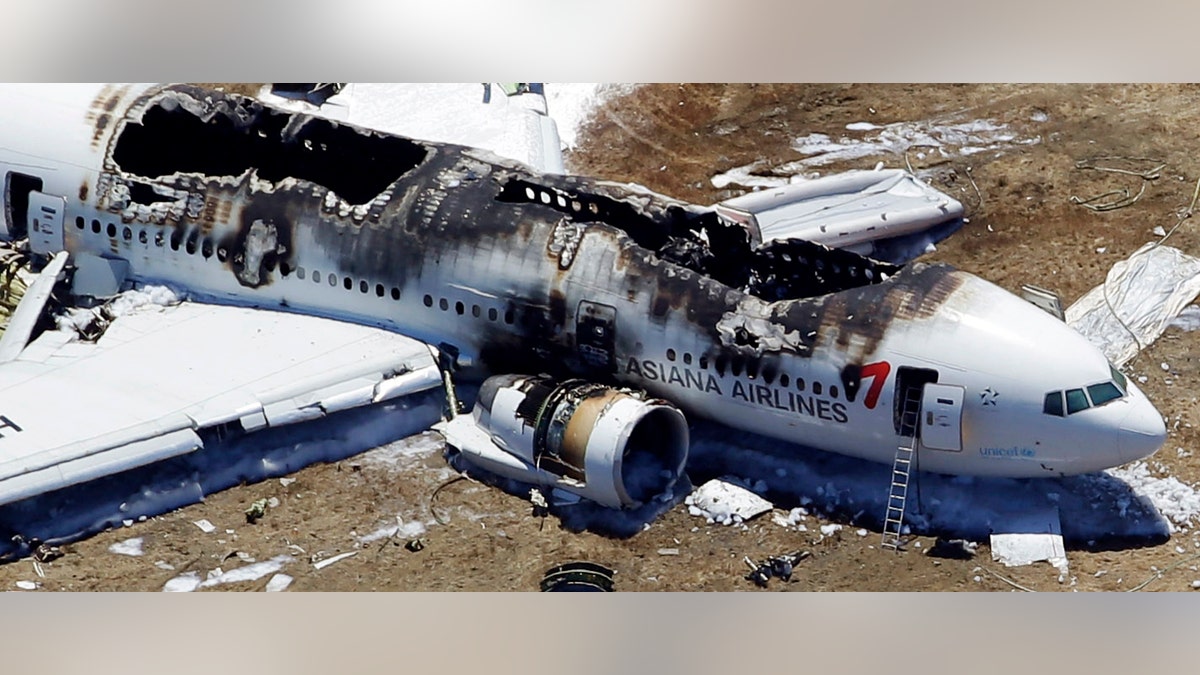
This aerial photo shows the wreckage of the Asiana Flight 214 airplane after it crashed at the San Francisco International Airport in San Francisco, Saturday, July 6, 2013. (AP Photo/Marcio Jose Sanchez) (AP2013)
One can only imagine what it must have felt like to be a passenger on an international flight for over 10 hours, to feel the aircraft at last coming in for a landing at San Francisco International Airport only to come up short, then to experience parts of the plane coming off and bursting into flames as you struggled to get out alive.
When I spoke with Dr. Chris Barton, Chief of Emergency Medicine at San Francisco General Hospital (where more than 50 of the survivors were brought for emergency treatment after the crash), he told me that "we saw ‘a lot’ of spinal injuries… probably from the axial loading of the plane slamming the ground – twice. A lot of facial bruising and forehead contusions – probably from the heads hitting the seat back in front of them."
What a frightening and horrific event for the passengers and their families. Even as their bodies heal most, if not all, will still be faced with nightmares, panic attacks, flashbacks, and other symptoms of post-traumatic stress for months after the crash, if not for the rest of their lives.
[pullquote]
And what about the rest of us -- those who watched the horrific images of the crash over and over on the news?
Will we now over-personalize the risk of flying?
Will we attach ourselves voyeuristically to the 24-hour-news reports and fear for our own safety?
Will we be poor role models for our children; extending our unease to them?
If we prepare in advance for possible plane crashes by wearing pants and sneakers and memorizing the emergency exits whenever we get on a plane, won’t we in fact be telling ourselves that an extremely rare event is actually about to happen?
Yet, as incredible as it sounds, we are no more likely to get into a plane crash today then we were yesterday, even if it feels like our odds have changed.
Most of us are afraid of flying to begin with. Flying by its nature scares us because it involved travelling 30,000 feet above the ground at hundreds of miles per hour and relinquishing control over our lives to a strange pilot we've never before met. The news that the pilot who crashed the plane at San Francisco did not have much experience flying a Boeing 777 certainly doesn't reassure us, though this was another extremely rare event.
Fear is a very powerful, contagious emotion especially the fear of death, but the facts remain on the side of air flight safety.
The number of deaths on U.S. highways in a year is typically more than 40,000, which is more than double the entire number of people who have died in commercial airplanes over the past half century. So if fear of flying leads you to forego air travel and drive to your destination instead, your chances of dying in an accident increase dramatically.
It is certainly understandable, if not entirely rational, that people across America are afraid to fly today. Over time this fear will extinguish itself, even as the roving eye of the news media moves on to the next disaster and we become afraid of that kind of an event instead.
What if I told you that courage and laughter flow through the same emotional centers of the brain as fear? If instead of giving in to our worry, how about if we learn to laugh at ourselves, and then show the courage we need to get on the next plane.
Over time, the courage to fly can cure the fear of flying. I can’t guarantee it in all cases, but it is my prescription for today.








































